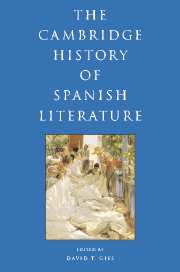Book contents
- Frontmatter
- I INTRODUCTION
- II HISTORY AND CANONICITY
- III THE MEDIEVAL PERIOD
- IV EARLY MODERN SPAIN: RENAISSANCE AND BAROQUE
- V THE ENLIGHTENMENT AND NEOCLASSICISM
- VI THE FORGING OF A NATION: THE NINETEENTH CENTURY
- VII THE MODERN, MODERNISMO, AND THE TURN OF THE CENTURY
- VIII TWENTIETH-CENTURY SPAIN AND THE CIVIL WAR
- IX IN AND OUT OF FRANCO SPAIN
- X POST-FRANCO SPANISH LITERATURE AND FILM
- 52 Spanish literature between the Franco and post-Franco eras
- 53 Post-Franco poetry
- 54 Spanish prose, 1975–2002
- 55 Post-Franco theatre
- 56 Spanish literature and the language of new media
- Bibliography
- Index
- References
53 - Post-Franco poetry
from X - POST-FRANCO SPANISH LITERATURE AND FILM
Published online by Cambridge University Press: 28 March 2008
- Frontmatter
- I INTRODUCTION
- II HISTORY AND CANONICITY
- III THE MEDIEVAL PERIOD
- IV EARLY MODERN SPAIN: RENAISSANCE AND BAROQUE
- V THE ENLIGHTENMENT AND NEOCLASSICISM
- VI THE FORGING OF A NATION: THE NINETEENTH CENTURY
- VII THE MODERN, MODERNISMO, AND THE TURN OF THE CENTURY
- VIII TWENTIETH-CENTURY SPAIN AND THE CIVIL WAR
- IX IN AND OUT OF FRANCO SPAIN
- X POST-FRANCO SPANISH LITERATURE AND FILM
- 52 Spanish literature between the Franco and post-Franco eras
- 53 Post-Franco poetry
- 54 Spanish prose, 1975–2002
- 55 Post-Franco theatre
- 56 Spanish literature and the language of new media
- Bibliography
- Index
- References
Summary
Filled with social tensions and political turmoil, the last years of Franco’s régime mark the demise of engaged and social poetry and see the beginning of the strong leadership of a group of poets called the novísimos (“newest”), even while a large number of contemporary poets maintained their own independent voices and particular styles. It was José María Castellet who started using the term novísimos in 1970 in his anthology Nueve novísimos poetas españoles (“Nine Newest Spanish Poets”), in which he includes some of the most distinguished poets of the time: Manuel Vázquez Montalbán (1939–2003), Antonio Martínez Sarrión (1939–), José María Álvarez (1942–), Félix de Azúa (1944–), Pedro Gimferrer (1945–), Guillermo Carnero (1947–), Leopoldo María Panero (1948–), Vicente Molina Foix (1946–), and Ana María Moix (1947–). From the very beginning this group sought to overcome the primacy of social poetry. The sense of social and political engagement and the hegemony of Realism had brought to poetry a certain platitudinous tone that urgently called for renewal. The new poetic language was sensorial, refined, and acquired a certain aesthetic primacy; as Castellet states, “la forma del mensaje es su verdadero mensaje” (“the form of the message is its true content”). Mass culture (movies, detective stories, rock music, popular myths), the camp sensibility (as defined and popularized in Spain by Susan Sontag), and all kinds of literary, historic, and artistic references enrich the poems of the novísimos, which reflected the improved economic and cultural standards of the country. These poets believed that art should not serve any practical purpose and they rebelled against the use of poetry as a weapon to achieve social or political change.
- Type
- Chapter
- Information
- The Cambridge History of Spanish Literature , pp. 694 - 704Publisher: Cambridge University PressPrint publication year: 2005
References
- 1
- Cited by



